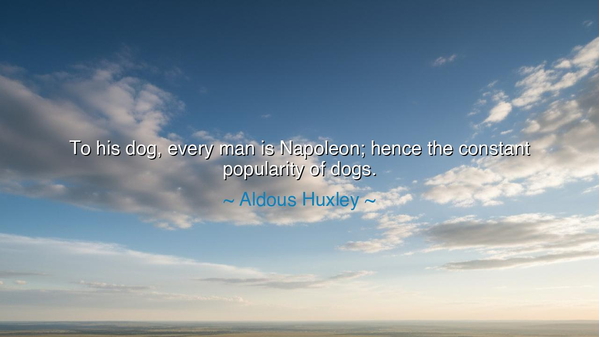
To his dog, every man is Napoleon; hence the constant popularity






Aldous Huxley, ever the sharp observer of human nature, once wrote: “To his dog, every man is Napoleon; hence the constant popularity of dogs.” In these words he mingles humor with truth, using the image of the mighty conqueror to reveal something profound about loyalty, admiration, and the hunger of the human heart. For the dog, unlike men, does not measure greatness in wealth or fame. To the dog, its master—no matter how poor, how flawed, how forgotten by the world—is a sovereign, a hero, a king. And therein lies the secret of their endless devotion and eternal appeal.
The origin of this thought lies in Huxley’s awareness of the paradox of human pride. Men crave recognition; they long to be admired, to be obeyed, to be remembered as Napoleon was remembered. Yet in the eyes of other men, admiration is fleeting, and power is always challenged. But in the eyes of a dog, admiration is constant, unconditional, unquestioned. The dog does not count your victories or weigh your failures; it crowns you with loyalty simply because you are its master. Thus, Huxley implies that what emperors sought on the battlefield, every man quietly receives at home—from the humble gaze of his dog.
History confirms this vision. Consider the story of Napoleon himself, exiled to Elba, stripped of empire, betrayed by allies, mocked by enemies. Once the ruler of Europe, he found himself alone and diminished. Yet even there, his dog remained by his side, offering the same adoration it had given him on the throne. When men fled, when glory crumbled, the dog’s loyalty remained unbroken. This image reveals the heart of Huxley’s words: greatness is not in crowns, but in the eyes that see you as great, even when you have fallen.
There is also the tale of Greyfriars Bobby in Scotland, a Skye Terrier who kept vigil at his master’s grave for fourteen long years. In the world’s eyes, his master had no empire, no renown, no glory. Yet to the dog, he had been Napoleon—the center of devotion, worthy of endless loyalty even beyond death. Such is the majesty of dogs: they elevate the common man to greatness, not through conquest, but through love.
But Huxley’s words carry a sharper edge as well. They reveal not only the loyalty of dogs, but the longing of man. Why are dogs so beloved? Because they give to every man what the world withholds: unchallenged respect, unwavering devotion, unquestioned greatness. In a world that belittles, criticizes, and judges, the dog alone exalts. Thus, men turn to their dogs not merely for companionship, but for a reflection of the greatness they wish to believe still dwells within them.
The lesson for us is twofold. First, we must be grateful for the love of our animals, who see in us what we often fail to see in ourselves: worth, dignity, strength. Let us not betray that trust by cruelty or neglect, but prove ourselves worthy of their devotion. Second, we must learn from the dog’s example, extending to others the same kind of loyalty and admiration. If a dog can see a hero in every man, perhaps we too can look past faults and failures to honor the hidden nobility in those around us.
Practically, this means treating others with respect even when the world devalues them. Offer encouragement to the weary worker, admiration to the overlooked, faith to the faltering. See them as the dog sees its master—not as small, but as great. In doing so, you awaken their courage, restore their dignity, and kindle their spirit. For men long not only to conquer, but to be seen as conquerors in the eyes of those they love.
So remember Huxley’s wisdom: “To his dog, every man is Napoleon.” It is both a celebration of the dog’s devotion and a reminder of humanity’s deepest hunger. Let us be humbled by such loyalty, grateful for such love, and inspired to reflect it in our own lives. For true greatness is not measured in battles won, but in the eyes of one who looks upon you with trust, and sees in you—always—a hero.






AAdministratorAdministrator
Welcome, honored guests. Please leave a comment, we will respond soon